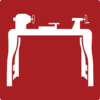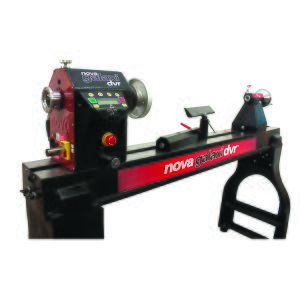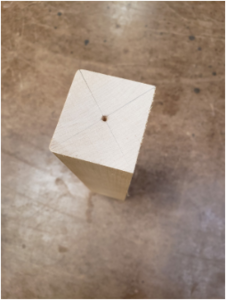Difference between revisions of "Wood Lathe"
| Line 56: | Line 56: | ||
====General Procedure==== | ====General Procedure==== | ||
# Get your stock at whatever size you need for your project, and make it square stock so that all sides are the same size. | # Get your stock at whatever size you need for your project, and make it square stock so that all sides are the same size. | ||
| − | # Mark the center of both ends and use a punch to indent on the middle of both ends. This helps the lathe to spin it at its center. | + | # Mark the center of both ends and use a punch to indent on the middle of both ends. This helps the lathe to spin it at its center.[[File:...woodLathe1.png|300x300px|thumb|none]] |
| − | [[File:...woodLathe1.png|300x300px|thumb| | + | |
# Make sure to use the two point centers on the lathe and ensure the motor head is tight on the rails. It would be very unfortunate to have your piece fly off. | # Make sure to use the two point centers on the lathe and ensure the motor head is tight on the rails. It would be very unfortunate to have your piece fly off. | ||
# Move the end head to a distance longer than your stock and place one end of the stock on the motor head center, lining up the punch hole with the center point. | # Move the end head to a distance longer than your stock and place one end of the stock on the motor head center, lining up the punch hole with the center point. | ||
Revision as of 09:11, 15 August 2019
Make: TeknaTool
Model: Nova Galaxi DVR
Ace: Needed (Makerhub@georgefox.edu).
Location: Wood Shop
Description
The wood lathe is a machine very similar to the metal lathe in the machine shop. It spins a piece of stock at a variable speed, and lets the turner create round objects. Unlike the metal lathe, there is not a cutter secured to the machine that is moved into place to cut. On the wood lathe, a turner will instead use long handled chisels to carve away the wood. Another difference is that for most projects, the wood is not clamped down in a found vise like the machining lathe, instead, two free-spinning center points on each side of the piece clamp the wood between them and hold it centered.
There are a wide variety of projects that can be done on the wood lathe, some easier than others, and all requiring a different need for skills and tools. This makes it hard sometimes to provide a common set of instructions, however, there some general safety rules and instructions for use that are used in any project on the lathe. The lathe can be fun to work with, but always remember, safety first.
Documentation
Terminology
Spindle: The spinning part
Chisel: The cutting tool
Tool Rest: The bar to help hold the tool in place
Training
Overview
Insert Text
Demonstration
Insert text
General Procedure
- Get your stock at whatever size you need for your project, and make it square stock so that all sides are the same size.
- Mark the center of both ends and use a punch to indent on the middle of both ends. This helps the lathe to spin it at its center.
- Make sure to use the two point centers on the lathe and ensure the motor head is tight on the rails. It would be very unfortunate to have your piece fly off.
- Move the end head to a distance longer than your stock and place one end of the stock on the motor head center, lining up the punch hole with the center point.
- Spin the handle on the back of the end head until the other center lines up with the punch hole on the other side of your stock.
- Rotate the handle and extra couple turns to push the stock into the motor head center and turn the red handle to hold the spindle in place. Now your piece is secured!
- Turn on the machine with the red switch on the side of the motor head. It will start to spin
- The metal tool rest should be at a height so that the tool on top of the rest will be cutting at the middle of the stock.
- The tool rest should be placed as close to the stock as possible where the stock can still spin freely without hitting the tool rest.
- Start the spindle at about 750 rpm.
- Use the gouge to slowly begin chipping away the wood. Make sure the chisel to pressed firmly into the tool rest and you are holding the bottom of the handle tight into your core.
- Slowly push the chisel up until it begins chipping at the wood.
- Start the the high parts of the piece or towards the middle if it’s all even, and move the chisel towards the end, chipping away little bits of wood at a time.
- Smooth out the wood, chipping away until you make a cylinder.
- Once you have the cylinder, choose one side to be the head.
- Gradually narrow down to a cone shape, then cut away material to make the three spheres of the snowman’s body.
- After the shape is done, sand the piece, progressively finer grit until smooth.
- Take the piece off, cut any remaining material and sand the mount points smooth.
- Yay, done.
Safety
Insert text
Certification
Foxtale Quiz
Troubleshooting
Maintenance
General maintenance
Insert text
Specific Maintenance Tasks
| Maintenance Procedure | Frequency | Done By |
|---|---|---|
| Sample | Sample | Sample |
The current Ace of the Wood Lathe is Needed (Makerhub@georgefox.edu).
Documentation
Training
The wood lathe is a machine very similar to the metal lathe in the machine shop. It spins a piece of stock at a variable speed, and lets the turner create round objects. Unlike the metal lathe, there is not a cutter secured to the machine that is moved into place to cut. On the wood lathe, a turner will instead use long handled chisels to carve away the wood. Another difference is that for most projects, the wood is not clamped down in a found vise like the machining lathe, instead, two free-spinning center points on each side of the piece clamp the wood between them and hold it centered.
There are a wide variety of projects that can be done on the wood lathe, some easier than others, and all requiring a different need for skills and tools. This makes it hard sometimes to provide a common set of instructions, however, there some general safety rules and instructions for use that are used in any project on the lathe. The lathe can be fun to work with, but always remember, safety first.


